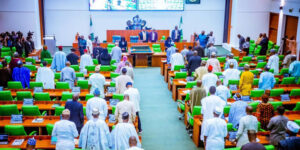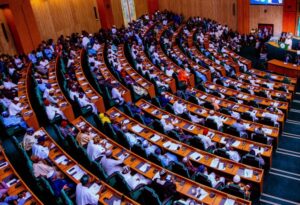The ongoing amendment of Nigeria’s 1999 Constitution has introduced an explosive debate—the creation of 31 new states. The proposal, now under review by the House of Representatives’ Joint Committee on Constitutional Review, has sparked a mixture of hope and skepticism. Political motivations, cloaked under the guise of progress, have raised alarms about the real agenda behind this push. Is this a genuine effort to improve governance or a calculated move to satisfy political elites?
Deputy Speaker Benjamin Kalu, who co-chairs the National Assembly’s review panel, disclosed that the proposal’s supporters have until March 5 to meet constitutional requirements for the plan to move forward. But as the clock ticks, the motivations behind this large-scale state creation remain under heavy scrutiny.

REACTIONS SPLIT ALONG REGIONAL LINES
The response to the proposal has been as diverse as the envisioned states themselves. Prominent Yoruba group, Afenifere, along with the Arewa Consultative Forum, have scoffed at the idea, dismissing it as unnecessary and self-serving. Meanwhile, the Middle Belt Forum and Pan-Niger Delta Forum have expressed support—contingent on the assurance of equal state distribution across the country. However, Ohaneze Ndigbo, the influential socio-cultural group of the South-East, has raised concerns, arguing that the proposal further marginalizes their region.
Should this proposal come to fruition, Nigeria would see its state count balloon from 36 to 67, which would mark a return to an even more fragmented political structure. Currently, Nigeria’s political map is divided into six regions with varying numbers of states: North-East (6), North-Central (6), North-West (7), South-West (6), South-South (6), and South-East (5). The new proposals would only exacerbate these regional imbalances.
A LONG AND COMPLEX PROCESS
For the proposal to be ratified, it must pass through multiple stages in the National Assembly. First, a two-thirds majority of members in the Senate, House of Representatives, and relevant state assemblies must support it. Then, a nationwide referendum must back the move, followed by further legislative approval. This complex and costly process raises questions about whether Nigeria’s current political climate, rife with divisions and resource constraints, can sustain such an ambitious venture.
Similar attempts at state creation were attempted in previous sessions of the National Assembly, yet failed to materialize. The looming 2027 elections seem to fuel suspicion that this push is less about development and more about political maneuvering. This further highlights the paradox of Nigerian governance: a focus on creating new bureaucracies rather than addressing the pressing needs of the country.
POWER AND GREED: THE REAL MOTIVATION?
A deeper look at the motivations behind the 31-state proposal suggests that this may not be about governance, but rather access to Nigeria’s lucrative national oil revenues. The creation of more states would provide new political positions—governorships and bureaucracies—all tied to the distribution of oil wealth. It’s a pattern that reflects the greed and self-interest that often underpins political action in the country.
Most of the proposed states are not economically viable and would likely be dependent on federal allocations to function. Only Lagos and Rivers States are self-sustaining, while the majority of others struggle with low internally generated revenues. For instance, in 2023, Lagos generated N815.36 billion in revenue, while states like Kebbi, Yobe, and Taraba brought in a mere N10-11 billion each. This fiscal imbalance underscores the dangers of creating new states without addressing the underlying economic weaknesses.

THE DANGER OF MORE STATES
Creating more states won’t address the root causes of Nigeria’s challenges—corruption, inefficiency, and lack of accountability. The notion that more states will result in better governance is misleading. In reality, it risks further atomizing the country, causing more division and less cohesion. The logic behind state proliferation—promoting development through smaller entities—has been disproven globally.
Consider Alaska in the United States: It’s the largest state, bigger than Nigeria, yet it remains a single entity. California, nearly half the size of Nigeria, boasts the world’s fifth-largest economy, yet operates under one state government. The lesson here is clear: success doesn’t come from fragmenting political entities, but from effective governance, resource management, and the prioritization of citizens’ welfare.
A CALL FOR REAL CHANGE
Nigeria’s focus must shift from creating more states to addressing the country’s urgent needs—namely, devolution of power, better resource management, and ensuring that the wealth generated from natural resources benefits all citizens. Rather than debating state boundaries, the National Assembly should focus on how to make Nigeria function as a true federation.
For too long, politicians have distracted the public with power plays, while the real issues—poverty, unemployment, and lack of basic services—persist. As the nation nears the 2027 elections, the push for new states could very well be a tactic to rally regional support or to bolster political careers. This is the moment for the people and their leaders to demand genuine change—before the distractions of state creation further derail the nation’s potential.
It’s time to set aside the trivial and focus on what truly matters: empowering Nigeria’s citizens through reform, accountability, and the realization of the country’s vast economic potential.




